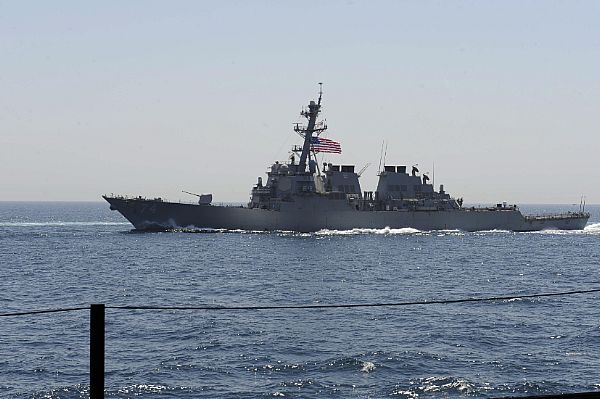Reconceptualizing the Link between Energy and Security
Editor’s Note: Energy markets are at the core of many national security debates. Whether it’s a discussion about Iran’s nuclear program, the importance of Libya, or China’s role in the world, questions about the security implications of energy are always raised. Llewelyn Hughes of Australian National University and Austin Long of Columbia are skeptical of many of the fears raised in national security debates. They argue that one of the key threats to energy markets is whether an actor can constrict a country’s supply of oil—and here U.S.

Published by The Lawfare Institute
in Cooperation With

Editor’s Note: Energy markets are at the core of many national security debates. Whether it’s a discussion about Iran’s nuclear program, the importance of Libya, or China’s role in the world, questions about the security implications of energy are always raised. Llewelyn Hughes of Australian National University and Austin Long of Columbia are skeptical of many of the fears raised in national security debates. They argue that one of the key threats to energy markets is whether an actor can constrict a country’s supply of oil—and here U.S. and allied military dominance makes this a threat in U.S., not enemy, hands.
***
Western framing of the relationship between oil and national security remains linked to concerns that the owners of oil-producing assets in Saudi Arabia or other Organization of Petroleum Exporting Countries (OPEC) might regain market power and use it to coerce countries that depend on imports to meet domestic demand.
This framing of oil and national security as a question of supply predates the 1973-4 and 1978-9 crises, dating back to the turn of the last century when U.S. firms were in a weak position in terms of international asset ownership and there were concerns about peaking production in the United States. In a recent article in International Security we argue that it’s time to rethink this view. The 1970s was never a useful heuristic for thinking about energy and national security, and the structure of energy supply and demand have changed markedly in the last 30 years. Most importantly, retaining this worldview obscures more important issues of oil and national security.
We focus on physical oil supplies rather than price. Over time the core focus of energy security has expanded to include issues such as affordability. This even shows up in the official “Shared Goals” of member states of the International Energy Agency. But we argue that when thinking about national security, it makes more sense to adopt a narrow approach by returning to the core concern of whether an actor can force a sustained reduction in the supply of energy.
When thinking about national security, it makes more sense to adopt a narrow approach by returning to the core concern of whether an actor can force a sustained reduction in the supply of energy.
“Affordability,” in contrast, varies widely based on economic circumstances. For example, the two major oil price peaks (in inflation adjusted terms) were December 1979 and June 2008. Yet while the peak in 1979 led to long lines at gas stations in the United States and a more general global energy crisis, the peak in 2008 (though economically painful) did not produce anything similar. Far better to focus on the concrete and measurable risk to actual supply of oil rather than price.
Here we know a few things: First, the effect of oil shocks on economies is typically small due to diversification of fuels outside the transport sector and other factors. Second, the oil supply chain is resilient. Third, and most important, a supply chain analysis of the potential for coercion in the oil market shows it is the United States that dominates supply routes in the international oil market.
The concentration of market power in oil is best understood through an analysis of the supply chain. Upstream production (i.e., the extraction of oil from the ground) is just one element; transportation and refining of crude oil are both equally important. It avails producers very little to pump oil they cannot readily bring to market—the recent difficulties Iraq’s Kurds and the government of Iran have had in selling their oil highlight that production alone is not enough.
Transportation, in particular, relies heavily on the overseas movement of oil from producers to consumers. This segment of the oil supply chain is affected both by concentration in the supply of oil tankers and by the concentration of naval power that can interdict those tankers. Our assessment shows that the former is not a concern. However, naval power—the ability to dominate the open oceans and therefore to deny other states the ability to use the seas to transport, is highly concentrated.
Using a standard measure of the concentration of power (the Herfindahl-Hirschman Index calculated using the weight of deep sea naval ships) it is clear the United States and its treaty allies (principally Japan, Great Britain, and France) monopolize naval power on the open ocean. Combined with its dominance in space and the air (at least over the open ocean) the United States thus has “command of the commons.” This means that the United States can, in extremis, significantly curtail and potentially even halt maritime transport of oil to or from adversaries.
Some important historical instances of maritime interdiction of oil, with varying levels of concentration of naval power, support our arguments. The first is the German U-boat campaign against oil transport in the Western Hemisphere that began in 1942. Germany in this campaign did not have a dominant position in naval power, as the U.S.-U.K.-Canada combined naval force greatly outmatched it. Instead it relied on surprise, favorable undersea geography, and technological and doctrinal shortcomings in the Allies. The result was that after an initial period of very significant disruption of the maritime transport of oil, the Allies solved many of their shortcomings, began sinking U-boats, and effectively ended the supply disruption.
The second case is the U.S. effort to interdict Japanese oil supplies during World War II. In contrast to the Germans, the United States was able to establish an increasingly dominant position in naval power in the Pacific after the Battle of Midway in June 1942. Combined with the seizure of island airfields closer to the Japanese home islands, U.S. naval dominance permitted the establishment of a comprehensive oil blockade against Japan. By the end of the war Japan had very nearly run out of petroleum products for its war machine, greatly curtailing key military activities.
The third case is the Tanker War between Iran and Iraq in the 1980s. Both sides lacked naval power but thanks to favorable geography (Iraq only has one major oil terminal) Iran was able to prevent Iraq from exporting oil by sea. Iraq in contrast was able to inflict some limited damage and significantly inconvenience the Iranians, but could not really interdict Iranian oil tankers.
Only the United States (and its major allies) can actually interrupt the maritime transport of oil on a sustained and significant scale.
From these cases we can conclude that while geography, surprise, and technological/doctrinal advantage can provide temporary or modest capability to affect the maritime transport of oil, only highly concentrated naval power offers a durable ability to force a sustained reduction in the supply of oil. Put another way, only the United States (and its major allies) can actually interrupt the maritime transport of oil on a sustained and significant scale. This means that no matter how much other great powers, such as China, develop upstream production overseas (such as in Africa) the United States can, in an extreme crisis or war, deny the ability to move oil across the ocean. Of course, Chinese leaders are almost certainly aware of this reality and may, over time, seek to undermine U.S. maritime dominance by developing its own open ocean navy, undermining U.S. alliances, or both.
By this metric it is the United States that is the real monopolist in energy markets, replicating the dominance it enjoyed in the pre-World War II period in oil production in the transport segment of the oil supply chain. In contrast, producers such as Saudi Arabia and Iran, have relatively little leverage given the growing diversification in upstream production from sources such as U.S. hydraulic fracturing (“fracking”). Policymakers should thus focus to a greater degree on managing the responses of potential adversaries to this risk, such as a U.S-China naval arms race, rather than concentrating on potential disruptions to energy supplies.






